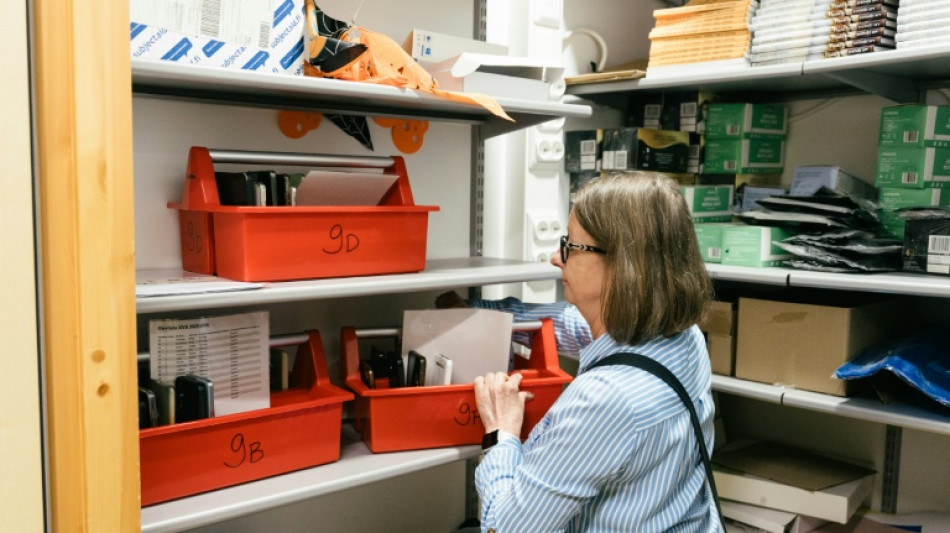
-
 Post-it maker 3M faces Belgian trial over 'forever' chemicals
Post-it maker 3M faces Belgian trial over 'forever' chemicals
-
UK comedian Russell Brand pleads not guilty to new rape, assault charges

-
 Duterte drew up 'death lists', boasted about murders: ICC prosecutor
Duterte drew up 'death lists', boasted about murders: ICC prosecutor
-
UK govt urged to release documents linked to ex-prince Andrew

-
 Rights group slams treatment of viral Japanese monkey
Rights group slams treatment of viral Japanese monkey
-
Inside the bunker where Zelensky led response to Russian invasion

-
 France demands explanation from US envoy over 'surprise' no-show
France demands explanation from US envoy over 'surprise' no-show
-
Putin failed to achieve goals in Ukraine, Zelensky says on war anniversary

-
 China tightens Japanese trade restrictions as spat worsens
China tightens Japanese trade restrictions as spat worsens
-
Ukraine war exhibition opens at Berlin Nazi bunker museum

-
 Jihadist threat puts eastern Senegal on edge
Jihadist threat puts eastern Senegal on edge
-
Kim Yo Jong: the powerful sister behind North Korea's supreme leader

-
 North Korea ruling party promotes Kim Jong Un's younger sister
North Korea ruling party promotes Kim Jong Un's younger sister
-
Mexico's Jalisco cautiously tries returning to normal after cartel violence

-
 Mexico's violence-hit Guadalajara to host World Cup games
Mexico's violence-hit Guadalajara to host World Cup games
-
Mourinho's Bernabeu homecoming upended by suspension, racism row

-
 China targets Japanese companies over military ties
China targets Japanese companies over military ties
-
Griezmann in talks to join MLS side Orlando City: source

-
 France to revoke US envoy's govt access after summons no-show
France to revoke US envoy's govt access after summons no-show
-
Spurs overpower Pistons in clash of NBA's form teams

-
 Inoue to fight Nakatani in Tokyo in May: reports
Inoue to fight Nakatani in Tokyo in May: reports
-
Canada PM to push trade, rebuild fractured ties in India trip

-
 Asian markets mixed as traders weigh AI and tariffs outlook
Asian markets mixed as traders weigh AI and tariffs outlook
-
Votes may 'melt like snow': Reform, Greens eye Labour UK bastion

-
 Venezuela says exiles welcome to return following mass amnesty
Venezuela says exiles welcome to return following mass amnesty
-
Australia buys parts for future AUKUS sub reactor

-
 Ukraine marks four years since Russian invasion
Ukraine marks four years since Russian invasion
-
Brazil court to try politicians over hit on black councilwoman

-
 Interim president says Venezuelans welcome to return after amnesty law
Interim president says Venezuelans welcome to return after amnesty law
-
Man kills police officer in Moscow train station blast

-
 Despite drop in 2025, Russian oil exports exceed pre-war volumes: report
Despite drop in 2025, Russian oil exports exceed pre-war volumes: report
-
Simulab Launches TraumaMan(R) System Ultrasound Module for Realistic Trauma Training

-
 Bytek Joins the Google Cloud Ready - BigQuery Program
Bytek Joins the Google Cloud Ready - BigQuery Program
-
Formation Metals Intersects 0.95 g/t Au over 61.1 Metres, including 1.68 g/t Au over 26.5 Metres at the Advanced N2 Gold Project; Bulk-Tonnage Gold Target Identified with 8 Kilometres of Strike to Explore

-
 Bolt Metals Announces Closing of Fully Subscribed Private Placement
Bolt Metals Announces Closing of Fully Subscribed Private Placement
-
InterContinental Hotels Group PLC Announces Transaction in Own Shares - February 24

-
 Nikon Expands Popular Monarch and Prostaff Binocular Lines
Nikon Expands Popular Monarch and Prostaff Binocular Lines
-
Australian PM seeks removal of UK's Andrew from line of succession

-
 Carrick hails 'ruthless' Man Utd match-winner Sesko
Carrick hails 'ruthless' Man Utd match-winner Sesko
-
N.Korea leader's sister promoted at party congress

-
 The key to taking down Mexico's most-wanted narco? His girlfriend
The key to taking down Mexico's most-wanted narco? His girlfriend
-
Winter storm blankets US northeast as travel bans imposed

-
 Super-sub Sesko fires Man Utd to win at Everton
Super-sub Sesko fires Man Utd to win at Everton
-
YouTube exec says goal was viewer value not addiction

-
 Panama wrests control of canal ports from Hong Kong group
Panama wrests control of canal ports from Hong Kong group
-
Trump denies top US officer warned of Iran strike risks

-
 Mayweather to fight Pacquiao in Las Vegas in September
Mayweather to fight Pacquiao in Las Vegas in September
-
US stocks tumble on tariff fog, worries over AI

-
 US says China 'massively expanded' nuclear arsenal
US says China 'massively expanded' nuclear arsenal
-
US forces to complete withdrawal from Syria within a month


Finnish phone ban brings focus, and chatter, back to school
Students huddle together in the corridor, chatter filling the air on a break between classes at a school in Finland, where mobile phones have been banned since school resumed in August.
At Kungsvagens Skola for students aged 13 to 15 in Sipoo, northeast of Helsinki, teachers collect students' phones in the morning and lock them in a storage room until the end of the school day.
Principal Maria Tallberg said the transition to a phone-free school had "exceeded expectations".
"Of course, they (students) grumbled a bit in the beginning, especially since they can't use them during breaks, but they also understand why, deep down," Tallberg told AFP during a recent visit.
"Many have also said they were not aware they were so addicted to their phones."
The new law banning phones during class-time came into force on August 1 across Finland, a country long known for its high-quality education.
Several municipalities and individual schools have now chosen to extend the ban to breaks as well.
Previously, the Finnish National Agency for Education had recommended that schools restrict the use of mobile phones in classrooms.
The ban comes amidst a global debate on how smartphone use affects not only mental and overall health, but also learning and education.
Reports, including one from UNESCO in 2023, have warned that phones in the classroom can hamper learning by causing distraction.
Several countries have adopted similar restrictions, including South Korea, Italy, the Netherlands and France.
- 'Very different' -
Annika Railila, a chemistry teacher at Kungsvagens Skola, said classrooms were now calmer and students less distracted.
"Before, we had to remind them almost every lesson that the phone stays in their bag and you don't use it during the lessons."
Students also socialise more during breaks now, she said.
"You actually get to see their eyes and faces, which is a lot nicer than to say hello to someone who's looking at the screen," she added.
15-year-old Kie Lindfors described the school environment as "very different".
"I talk more with people and there is a room in the school where there are board games and stuff so that's been lots of fun on recess, going there to play," he said.
His classmate Lotta Knapas felt the school had become "a lot more noisy" and "wild".
"I understand that we can't use them in lessons but I think it is kind of dumb they take them away from us for the whole day," she said.
Meanwhile, Oscar Ingman, 14, feared some students might feel more lonely.
"I see more people being more sociable, more people talking and so on. But I also do see occasionally some people just sitting alone in a corridor," he said.
The school aimed to organise activities to prevent kids from having nothing to do, the principal said, noting that internet bullying at the school had already decreased.
"Students used to take pictures and film both during lessons and a lot on breaks, and we often had to investigate when video clips were shared everywhere," said Tallberg.
- Reverse the trend -
Finland's new law was adopted after education scores plunged, Finnish Education Minister Anders Adlercreutz told AFP.
"We have noticed in Finland, as in many other countries, that our reading and mathematic skills have deteriorated and the Finnish approach is to think about how we can create more space for learning and teaching," Adlercreutz said.
"Removing disturbing elements from the classroom helps."
The latest results from the OECD's Programme for International Student Assessment (PISA) from 2022 showed Finnish 15-year-olds' skills in mathematics, reading comprehension, and science had declined.
Finland nonetheless still ranked above the OECD average for all subjects among the 38 member countries.
The phone ban did not mean schools were exiting the digital world, Adlercreutz insisted.
"It is important for children to have physical books, but they also need to be digitally literate," he said.
"But in a world that is moving so fast, perhaps the role of schools is also to teach slowness, to be a place where you have to force yourself to read longer texts, focus on one thing, and work purposefully toward a long-term goal."
O.Johnson--AMWN



